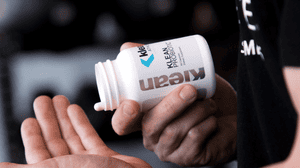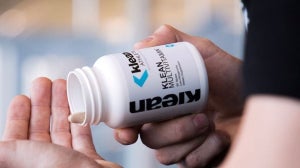

Nutrient timing refers to a strategic approach of consuming foods, beverages, and/or supplements at predetermined times to obtain specific performance-based outcomes. The Klean Nutrient Timing series will address the ins and outs of pre-, during, and post-nutrient timing, as well as daily maintenance, with the goal of optimizing performance and promoting immune health in athletes.
Please note that all guidelines are subject to trial and error. As an athlete, it’s crucial to experiment during your training so you can adjust your food and fluid volume based on gut tolerance and find a perfect daily nutrient timing routine.
The Motivation

Before athletes hit the road, field, track, or court, they need to make sure their tanks are filled to the brim so their engines can run on full throttle. Adequate fuel before exercise will ensure athletes have immediate energy to burn and their precious glycogen stores are topped off, which will help promote blood sugar balance and reduce hunger and fatigue, especially during prolonged exercise.
If done correctly, it can help minimize gastrointestinal (GI) distress and athletes’ fuel tanks will have a nice blend of amino acids that will jump-start muscle protein synthesis (MPS) once their exercise sessions are complete. Add some fluids to the mix and they are set to perform at their personal best.
The Details
Pre-Exercise Carbohydrates: The benefits of pre-exercise carbohydrates depend on athletes’ stores of carbohydrate (aka glycogen stores). Athletes with lower glycogen stores, such as those with limited rest between training sessions, multiple training sessions per day, low daily energy intake, suboptimal post-exercise recovery fueling, or early morning workouts will benefit the most from pre-exercise carbohydrate feedings. Additionally, the higher the intensity of exercise or the longer the exercise session, the more an athlete will benefit from pre-exercise carbohydrates. These benefits relate to the exaggerated use of carbohydrates under these circumstances and to the pronounced effects that these modes of exercise can have on the immune system.
Pre-Exercise Protein: Infusing the fuel mix with a balanced blend of amino acids (Klean BCAA + PEAK ATP), particularly in the form of whey (Klean Isolate), a few hours prior to exercise will support the synthesis of a variety of key proteins, such as skeletal muscle proteins and other key bodily components that facilitate recovery and adaptation to training.[1]‡
Fluids and Electrolytes: Athletes competing in prolonged endurance events, especially when performed in hot weather and multiple times per day, can also benefit from additional fluids and electrolytes prior to exercise. The fluids and electrolytes will support normal muscle physiology and ensure adequate hydration.
The Pre-fuel & Hydration Plan
Pre-meal Planning
Consume a solid (300-500 calorie) mixed meal containing all three macronutrients (carbs, proteins, and fats), three to four hours prior to competition so the stomach is relatively empty, but the internal stores are stocked and ready to go.
Carbohydrates
1g/kg 1 hr prior; 2g/kg 2 hrs prior; 3g/kg 3 hrs prior; 4g/kg 4 hrs prior
Calculation Connection: 3 hours prior: 160 lb 2 = 73 kg x 3 g/kg = 219 grams of carbs
Note: All of the recommendations above do not need to be satisfied. Overall, carb intake should be progressively reduced as athletes near their training sessions. The timing of the last meal, time until the start of training, and gastrointestinal tolerance will help determine when and, therefore, how many carbs to consume.
Rinse the mouth with 6% carbohydrate solution (Klean Hydration) for 10 seconds prior to competition. If an athlete experiences dizziness, confusion, irritability, or shakiness when consuming carbs prior to exercise, they should aim to limit carbs within one hour of exercise to avoid rebound hypoglycemia.
Limit high fiber foods 3-4 hours prior to intense training or competition. Individual tolerance will vary.
If necessary, limit sugar alcohols, lactose and fructose prior to and during exercise to minimize GI upset.
Proteins
3-4 hours Prior to Training or Competition: 20-40 grams of protein
1-2 hours Prior to Training or Competition: ~10-20 grams protein
Protein references (grams per serving):
1 ounce meat, poultry, fish = size of a matchbox = 7 g
3 oz meat, poultry, fish = size of a deck of playing cards = 21 g
1 egg = 6 g
1 cup ultra-filtered milk = 8 g
1 cup beans = 15 g (watch for fiber intolerance)
8 oz Greek yogurt = 20 g
1 scoop Klean Isolate = 20 g
Fats
Avoid fats 2 to 4 hours prior to exercise to avoid gastrointestinal upset.
Fluids and Electrolytes
4 hr prior: 5-7 ml/kg, if adequately hydrated.
Example: 160 lb 2 = 73 kg x 5-7 ml/kg = 365-511 milliliters 30 ml/oz = 12-17 ounces
2 hr prior: Add 3-5 ml/kg or ~10-12 oz if no urine is produced or urine is dark in color after consuming the 12-17 ounces 4 hours prior.
10-20 min prior: 7-10 oz
Consuming fluids with electrolytes (Klean Electrolytes) leaves muscles hydrated and tops off-key muscle components to ensure optimal muscle physiology.‡
The Brilliant Extras
For athletes performing multiple daily workouts, especially in the heat, low glycogen stores and the loss of sodium, potassium, chloride, calcium, and magnesium can lead to dehydration and diminished exercise capacity. Klean Hydration will provide a carbohydrate boost while topping off-key electrolytes to keep muscle physiology primed. Mix one scoop of Klean Hydration with 8 ounces of water up to one hour prior to exercise.‡
If glycogen stores have been diligently stocked, but an athlete wants to ensure peak electrolyte status, they can grab 1 to 2 Klean Electrolyte capsules prior to working out.‡
When intensity is a top priority, Klean Creatine before working out can help increase muscle strength, performance and recovery.[3] Mix 1 scoop of Klean Creatine with 8 ounces of carbohydrate-containing beverage 30 minutes prior to exercise.‡
Klean SR Beta-Alanine is another great addition prior to intense workouts to balance acid build up, which can disrupt normal muscle physiology.[3] Take two tabs about 30 to 60 minutes prior to exercise.
And last, but not least, if an endurance athlete wants to support their nutrient needs from all directions, a combination of the aforementioned products would be a great investment.
If you currently have a professional, wholesale, or affiliate athlete account, click here to place your order.
________________________________________Created by Karlyn Grimes, MS, RD, LDN, CSSD+

A Guide to Nutrient Timing, Part 2: Intra-Exercise Inevitabilities
Continue to discover how correct nutrient timing can benefit your performance.
________________________________________References1. Arent, S.M., Cintineo, H.P., McFadden, B.A., Chandler, A.J., & Arent, M.A. (2020). Nutrient Timing: A Garage Door of Opportunity? Nutrients, 12(1948), 1948.2. McCubbin, A. J.,Cort, M.M., Crawshay, S.T., Gaskell, S.K., Jay, O., Shaw, G., et al. (2020). Sports Dietitians Australia Position Statement: Nutrition for Exercise in Hot Environments. International Journal of Sport Nutrition & Exercise Metabolism, 30(1), 83-98.3. Roberts, B.M., Helms, E.R., Trexler, E.T., & Fitschen, P.J. (2020). Nutritional Recommendations for Physique Athletes. Journal of Human Kinetics, 71(1), 79. ________________________________________








